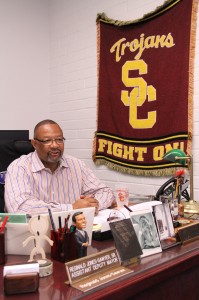Assemblyman stresses education in California
One glance into California Assemblymember Jones-Sawyer’s office and it’s not hard to guess where he went to college. A USC blanket hangs on the wall and a Trojan cup rests on his desk. There is certainly a strong sense of Trojan Pride here.

Trojan pride · USC alumnus and California State Assemblymember Reggie Jones-Sawyer speaks to the Daily Trojan in his office on Tuesday. – Austin Vogel | Daily Trojan
In Nov. 2012, Jones-Sawyer, who graduated from USC in 1979 and later attended Harvard University, was elected to represent California’s 59th State Assembly District, which includes South Los Angeles, Florence-Firestone, Huffington Park and Walnut Park.
During his first year in office, Jones-Sawyer focused mainly on education and the availability of quality schooling.
Jones-Sawyer’s interest in education in part stems from his heritage. His uncle, Jefferson Thomas, was one of the original Little Rock Nine, a group of black students who were involved in the 1957 desegregation of Little Rock Central High School, an event that gained national attention.
“He was kicked, beaten, sworn at — they even burnt crosses on my grandfather’s home,” Jones-Sawyer said.
Jones-Sawyer interprets the struggle of his uncle to attend school and get an equal education as his impetus to improve the school system and help struggling Latino and African American youth in California.
“[My uncle] suffered through a whole lot so I could go to any school I wanted. If it wasn’t for him, I wouldn’t have been able to go to USC or Harvard,” he said.
According to Jones-Sawyer, the main reason many young people aren’t successful in today’s society is because they do not receive a proper education.
“My uncle almost died so we could give them the best education possible. And here we are in 2013, and California is failing in the school systems,” he said. “I’m here hopefully trying to reverse that.”
But Jones-Sawyer wasn’t always so passionate about learning. During his time at USC, Jones-Sawyer said he was spending too much time with his fraternity, Kappa Alpha Psi.
Eventually, Jones-Sawyer’s grades suffered. After he ended up on academic probation, his grandmother sat him down in the kitchen and told him he could not “sacrifice this education.”
She told him a story she had never told anyone, about how in 1957 she was sitting in her kitchen when she received a threatening phone call.
“The voice on the other end said, ‘Get your son out of school or your grandson will never make it to school,’” Jones-Sawyer said. “She looked at me and said, ‘That grandson was you.’”
The next year, Jones-Sawyer went from academic probation to USC’s dean’s list; and since then, he has made sure not to squander his hard-earned education.
It is because of his uncle’s commitment to education and the struggle of his family to make a change in education that he decided to run for the Assembly.
“I decided I would give back and run for office. I wanted to make a difference in people’s lives because of that one day sitting in my grandmother’s kitchen,” Jones-Sawyer said.
Since then, he has graduated from USC with a bachelor of science in public administration, and then attended Harvard University’s John F. Kennedy School of Government for senior executives in state and local government program.
He went on to serve as assistant deputy mayor of Los Angeles, where he helped to develop the Magic Johnson Theater and the Staples Center.
In 2012, when the 59th Assembly District seat opened up, Jones-Sawyer decided to run for Assembly, and he said was eager to make a difference in the education of others.
“When I was younger, I wanted to be an elected official — every young boy wanted to be president, and my family has always taught me to reach for the stars,” he said.
Though he’s not president, Jones-Sawyer said being the Assemblymember for the 59th district comes pretty close.
The position makes him one of the 120 people who make decisions for 38 million California residents on a daily basis.
“I now have a great opportunity to make change — to make a change in the lives of people who are poor and not getting the best education,” he said.
Jones-Sawyer hopes to help move black and Latino men out of prison and into well-paying jobs. His goal is to stop the cycle of young men going back into the prison system.
It’s a solution sought through rehabilitation in contrast to incarceration, which Jones-Sawyer believes will solve California’s problem of prison overcrowding.
A prisoner spending a year in jail costs taxpayers $55,000, according to Jones-Sawyer.
“[For that money], we could send someone to USC for four years and have them be a more productive member of society,” Jones-Sawyer said. “From a business perspective, it’s better to invest in people so they can get an education and learn a skill or get a college degree and then get a good, paying job.”
Another issue that Jones-Sawyer is passionate about is AB 549, a bill he authored, that encourages greater school safety guidelines for mental health professionals, school counselors and police officers on campuses. The bill is currently awaiting Governor Jerry Brown’s signature.
He believes that addressing delinquency problems in school will help prevent the incarceration of young men and women in the future.
Jones-Sawyer said he feels so strongly about education because he credits his own education at USC for much of his professional success.
“USC prepares you to be the CEO, to be president, to be superintendant of schools. USC prepares you to run the place, it takes you beyond just being good and prepares you to be great,” Jones-Sawyer said.
Follow us on Twitter @dailytrojan
